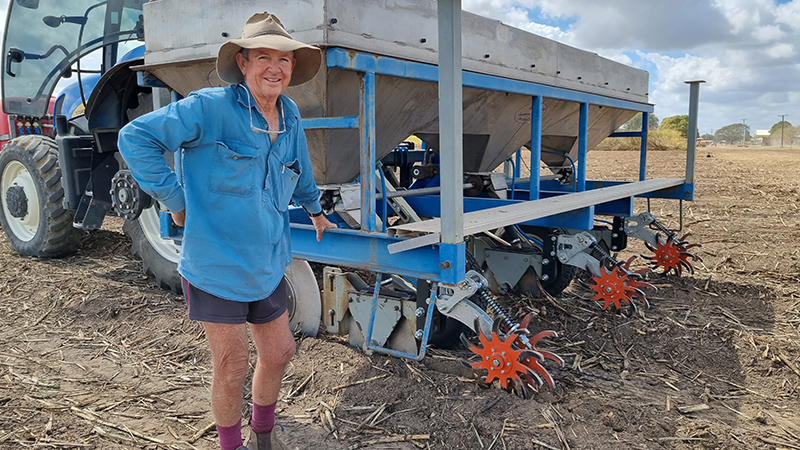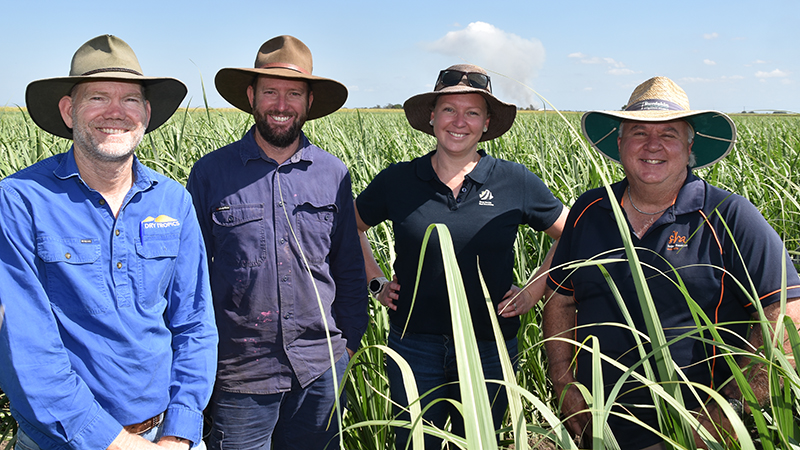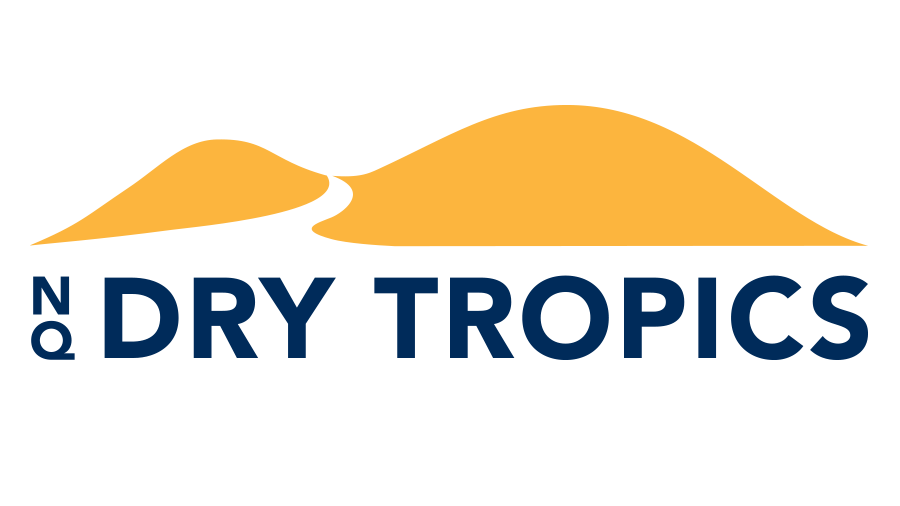Burdekin Irrigation Project
(Part of the Lower Burdekin Water Quality Program delivered by Sugar Research Australia with support from a consortium of stakeholders, including Agritech Solutions, Burdekin Productivity Services, Burdekin Bowen Integrated Floodplain Management Advisory Committee Inc. (BBIFMAC), Department of Agriculture and Fisheries (DAF), Farmacist, and James Cook University.)
AT A GLANCE
- 63 growers managing 6987ha.
- 18,363 kg/year reduction in DIN (modelled using the Paddock to Reef Projector Tool)
- 5320 hrs/ year of delivery team engagement with growers
- 62 participants at training events
- 50 baseline irrigation system assessments delivered to growers
- 29 irrigation automation plans developed
- 40 irrigation management plans were delivered to growers with 21 automated irrigation systems installed (technology level 3)
Growers Lisa and Ross Parker… realised significant savings in power and water.
WILMAR SUGAR AND RENEWABLES
Wilmar Sugar and Renewables is lowering energy and water costs by embracing practice change that also delivers improved environmental outcomes.
Wilmar is a large grower in the North Queensland sugarcane industry, with around
7,300 hectares in production across four districts – 3,900 hectares of which are spread across multiple farms in the Burdekin region.
Through joining the Burdekin Irrigation Project (BIP), Wilmar staff worked closely with Sugar Research Australia (SRA) and a range of other local partners to improve irrigation efficiency on a 130-hectare farm in the Upper Haughton region.
Chris Scovazzi, Wilmar Farms Group Manager, said joining the BIP made sense on multiple levels from a production and environmental standpoint.
“At Wilmar, we are acutely aware of the groundwater issues in the Burdekin River Irrigation Area (BRIA), and the potential it has to reduce sugarcane productivity,” Chris said.
“Joining the BIP was a chance to lead by example and reduce our impacts, particularly losses to deep drainage, while incorporating innovative technologies to save time and cost.”
Practices adopted included installing an automated irrigation system, varying flow rates, and fitting end-of-row sensors to detect when water reached the end of furrows.
Establishing a baseline
As BIP participants, Wilmar staff received ongoing support from SRA, as well as local industry providers Agritech Solutions, who provided technical irrigation design and installation support, and Burdekin Bowen Integrated Floodplain Management Advisory Committee (BBIFMAC), who undertook regular on-ground monitoring for water, nutrient, and pesticide runoff.
SRA’s Burdekin District Manager, Terry Granshaw, said assessing current irrigation practices and quantifying losses to deep drainage and runoff was key to determining the best plan of action.
“At the start of the project we spent about a month with Wilmar observing how they irrigated, and taking measurements, which gave us a baseline to work from,” Terry said.
“Irrigation sets were running 24 hours per day on a seven-day cycle, at a flow rate of one litre per second.
“In the first year, we doubled the flow rates on the trial paddocks to two litres per second, while continuing existing rates on control paddocks.
“When you increase flow rates, you increase the risk of losing more water out the end of the furrow, if you don’t turn the water off at the right time. This is where the automation and end-of-row sensors came into play.
“We also placed advanced sensors every 150m down the field so we could measure how quickly the water was advancing from stage to stage. And what’s really good about that is we ended up finding soil constraints in the middle of the farm that we didn’t know were there.”
Multiple benefits of automation
Chris said while it was early days in the project with only one year of data, installing the automated irrigation system had shown multiple benefits to the farming operation, saving time and money, while minimising runoff.
“We have reduced the volume of water applied from the recycle pit and channel by 35 per cent as well as prevented 2 megalitres per hectare being lost to deep drainage,” Chris said.
“Irrigation time was reduced from 24 hours to as low as 5.2 hours, with the number of irrigation events per year decreasing from 24 to 15.
“We can now change irrigation sets using smart phones or tablets when our irrigators are away from site, which saves time and allows us to redeploy staff to other jobs.
“We have seen reductions in energy use, with less runoff into the recycle pits meaning these pumps aren’t running as often. This also reduces carbon emissions, in keeping with Wilmar’s Vision 35 target.
Ultrasonic flow meter on a Sunwater delivery pipeline valve.
“The project was estimated to have achieved a 53 per cent reduction in DIN loss, meaning more fertiliser was available for the crop. Despite the reduction in irrigation volume, there was no loss in yield or CCS on the trial site compared to the control site.”
Embracing the change
Terry said Wilmar’s irrigators were excited by the possibilities of adopting ag-tech to make their job easier.
“The irrigators have been fantastic, taking on board a completely new irrigation practice,” he said.
“One of the employees told me he used to come back three or four times to check the bottom end of the farm when he was irrigating. Now he only needs to do it once.
“Technology allows people to try things that are out of the box, and that they wouldn’t normally do. That’s been the eye opener. There is less fear of using tech now compared with 10 years ago.”
Chris said irrigators on other Wilmar farms had started manually making changes to their practices based on what had been learned from the BIP site.
Sharing results with the community
Chris said the project team had taken every opportunity to share findings with a range of internal and external stakeholders.
“Environment Protection Agency staff came out to take a look and it was good to show them the sugar industry is taking steps to be more sustainable,” he said.
“We held meetings with other community partners, including staff at the mill. We also hosted our Senior Leadership Team on site and it was refreshing to show them the farms are leading the way in the technology space. They have shown a lot of interest in the trial, and it has been an eye opener for the business.”
Plans to expand
Chris said comparing early trial data and control sites had provided the necessary evidence to secure a commitment from senior management to automate a further 240ha of land on Wilmar’s Stockham Road farm.
This project is part of the Lower Burdekin Major Grants Program, which aims to support participants in the BIP and other projects within the Lower Burdekin Regional Water Quality Program to maintain momentum and achieve further efficiencies.
“As soon as we saw the figures after harvesting the cane we were very surprised – it was a no-brainer and gave us the justification we needed,” Chris said.
“We calculated the new project would pay itself off in under two-and-a-half years.
“Ideally, we’d like to roll out automation on all our farms in the Burdekin and then further south to Proserpine. This project is giving us the confidence it can be done.
“Without being part of the BIP we would still think we were doing a good job with our irrigation. You don’t know what you don’t know. Everyone wants to do the right thing, and now we have the data we can put our hand on our heart and know we are doing the right thing.”
ROSS AND LISA PARKER
Ross and Lisa Parker’s 110ha cane farm is typical of the Burdekin Delta, where sandy soils are prone to high water infiltration and deep drainage. Years of prior planning and infrastructure investment, including upgrading their pipe network, meant they were ready to take the next steps to improve irrigation efficiency, with support from the BIP.
Ross and Lisa were keen to keep water, nutrients, and pesticides on their land. They also wanted to improve their work-life balance by installing an automated irrigation system so they could spend less time checking on irrigation sets and maintaining records.
“We had a plan from the start to get more efficient, although we didn’t know whether we would be able to afford it,” Lisa said.
“We want to be economically sustainable by increasing profit and reducing expenses, but it’s also important for us to farm in an environmentally sustainable and responsible way.
“We’ve got little kids, and we want them to be able to enjoy the Great Barrier Reef in the future.
“And then there’s the investment in our quality of life and giving us more family time, which you can’t put a price on.”
Support received
Lisa said the couple met with local company Agritech Solutions early in their journey to discuss their plans to automate.
“Steve Attard from Agritech told us there was a lot we had to do first, so we did tariff and pumping assessments, and replaced a heap of pipeline and that really helped us with the BIP application,” Lisa said.
Ross said Sugar Research Australia then supported them to select the most appropriate block to trial different irrigation practices, such as surge irrigation.
“The automation makes this possible and everything is automatically recorded,” Ross said.
Lisa and Ross Parker with dog Cooper.
“I hate writing stuff down, but now it’s simplified, and in three years’ time I’ll be able to look back and see exactly how much water I used during an irrigation set.
“To me, if it’s not accurate data, you may as well not have it.”
Successes
Not all yield data is yet available, however, Ross is confident there is no difference in the crop at the trial site despite a major reduction in power and water use.
“Last year was a 36 per cent saving in water use by using high inflow rates and surge which admittedly has taken some time to perfect,” Ross said.
And Ross said automation had given them back valuable time that would have been spent checking irrigation sets.
“Running the farm was a full-time job, but now with automation, we can concentrate on our other farm,” Ross said.
“At nine o’clock at night, just before we go to bed, it’s a matter of just ripping around and making sure everything’s running as it should.
“There’s no more changing clamps and changing cups, no more walking along the bottom and making sure all the furrows are all out, paddling through the mud and peeling spiders off our faces.
“We have only automated part of the farm, but now we want to do all of it.”
Challenges
Their first year as part of the BIP has not been without its challenges, however, some of these were expected given the farm’s location and soil type.
Ross said the farm was a jigsaw puzzle with lots of inconsistent block sizes and row lengths, old leaking pipework and a fair share of soakage problems.
“We have been a little bit of a guinea pig because we’ve got a lot of challenges you would see on a typical Delta farm,” he said.
“You need to have good fluming and you have to be careful to prevent cups being sucked into the fluming, as well as be mindful of issues with variable pressure from bores and so on.
“We’ve learnt a lot along the way to show automation can and does work, even on these smaller Delta farms.”
FURTHER READING
LOWER BURDEKIN WATER QUALITY PROGRAM
Stool Zippas

NQ Dry Tropics’ Major Grants project encouraged growers to invest in equipment, technology or agronomic services to reduce the amount of nitrogen fertiliser applied to their crop. Some opted for Stool Zippas .
READ MORE>>
Innovations Day

Lower Burdekin cane growers heard about the “latest and greatest” innovations available to improve efficiency, profitability and sustainability at a Field Day on Aaron Linton’s Home Hill farm recently.
READ MORE>>
Program home

Between 2020 and 2024, more than 100 cane growers have improved irrigation, nutrient and pesticide management, resulting in widespread practice change and significant water quality improvements.
READ MORE>>
Major Grants

Innovation has long been a driver of improved profits, improved application of water, fertiliser and pesticide on sugar cane crops. Innovations that lead to increased profitability and resilience for the grower and reduced runoff from farms for the Great Barrier Reef are the things that excite us.
READ MORE>>
Precision-Decision

Giving growers a better understanding of soil types, better control over application of soil ameliorants and better data for long-term decision-making on-farm.
READ MORE>>
Bluewater

Optimising the amount of pesticide and the delivery of pesticide can save growers thousands of dollars, but it also helps to reduce run off and loss of chemical that could end up in waterways flowing out to the Great Barrier Reef.
READ MORE>>




